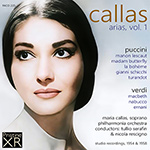
This album is included in the following sets:
This set contains the following albums:
- Producer's Note
- Full Track Listing
- Cover Art
In the pantheon of twentieth-century opera, Maria Callas reigns not only as a voice of unrepeatable individuality but as a dramatic force who redefined the interpretative scope of the soprano repertory. These landmark recordings — drawn from two celebrated sessions with the Philharmonia Orchestra in London, in 1954 and 1958 — capture her at the height of her vocal powers and at the peak of her insight into two composers who formed cornerstones of her stage career: Puccini and Verdi.
The Puccini arias, recorded in 1954 under the baton of Tullio Serafin, showcase Callas’s uncanny ability to illuminate the emotional core of each heroine. In "Un bel dì, vedremo" from Madama Butterfly, she presents Cio-Cio-San not as a passive victim but as a woman clinging to hope with tragic clarity. There is no self-pity here — just controlled tension and aching resolve, delivered with extraordinary subtlety of phrasing and colour.
In "In questa reggia" from Turandot, Callas’s voice takes on a glittering, imperious tone. Her Turandot is not merely cold but deeply wounded, and the central monologue becomes a chilling declaration of power and pain. The partnership with Serafin draws out the music’s latent drama and psychological depth. Few interpretations have so convincingly conveyed the blend of myth and trauma in Puccini’s last great enigma.
The arias from La Bohème and Manon Lescaut reveal a different Puccinian world: youthful vulnerability and lyrical yearning. In "Sì, mi chiamano Mimì", Callas floats the phrases with touching simplicity, while in "In quelle trine morbide" from Manon Lescaut, the voice darkens and slows, evoking a woman trapped between luxury and longing. Her use of legato and finely shaded dynamics gives each phrase narrative weight.
The Verdi arias, recorded in 1958 with Nicola Rescigno conducting, showcase Callas’s dramatic imagination in its most uncompromising form. From Macbeth , her Lady Macbeth is elemental. In "Nel dì della vittoria… Vieni! t’affretta!", she hurls the lines with ruthless energy, her tone sharpened into a weapon. In "La luce langue", the voice dims with the dying light, creating an atmosphere of eerie, controlled malevolence. Finally, in the sleepwalking scene, "Una macchia è qui tuttora", Callas strips the character to her haunted core. Her voice becomes disembodied — fragmented, spectral — the descent into madness chillingly real.
In Nabucco, "Ben io t’invenni… Anch’io dischiuso un giorno" finds Callas as the tormented Abigaille, expressing regret with regal control and aching introspection. Her mastery of Verdian line and tone colours this aria with complexity and tragic grandeur, far beyond mere vocal brilliance. Even in an excerpt, she finds a complete psychological portrait.
From Ernani, "Surta è la notte… Ernani! Ernani, involami" becomes a miniature operatic scene. Elvira’s urgency, her longing and desperation, are etched into every phrase. Callas dispatches the florid writing with ease, but it is the emotional immediacy — her ability to bring the character to life in minutes — that lingers. She transforms the conventional tropes of early Verdi into something intimate and urgent.
In these Verdi roles, Callas uses every facet of her voice as a dramatic tool. Ornament becomes expression; silence carries weight. These are not simply arias but distilled dramas — entire acts condensed into a few minutes. Her theatrical instinct shapes the structure of every phrase, turning vocal technique into storytelling.
XR-remastered with new clarity, these recordings reaffirm Callas not just as a voice of legend but as a singular interpreter of character, mood, and musical structure. Whether navigating the lyrical sweep of Puccini or the psychological rigour of Verdi, she brings to each phrase an intelligence and emotional force that continue to astonish. Her voice was never about beauty alone — it was about meaning, tension, fire. In these Philharmonia sessions, we are reminded not just of Callas’s artistry, but of her unshakeable presence — as vivid and unsettling now as it was over half a century ago.
MARIA CALLAS Arias, Vol. 1
PUCCINI Manon Lescaut
1. In quelle trine morbide (Act 2) (2:55)
2. Sola, perduta, abbandonata (Act 4) (5:52)
PUCCINI Madama Butterfly
3. Un bel dì vedremo (Act 2) (4:34)
4. Con onor muore (Act 2) (3:43)
PUCCINI La bohème
5. Sì. Mi chiamano Mimì (Act 1) (4:50)
6. Donde lieta usci (Act 3) (3:22)
7. PUCCINI Gianni Schicchi - O mio babbino caro (2:34)
PUCCINI Turandot
8. Signore, ascolta! (Act 1) (2:31)
9. In questa reggia (Act 2) (6:24)
10. Tu che di gel sei cinta (Act 3) (2:50)
VERDI Macbeth
11. Nel dì della vittoria ... Vieni! t'affretta (Act 1) (7:48)
12. La luce langue (Act 2) (4:12)
13. Una macchia è qui tuttora (Act 4) (11:13)
14. VERDI Nabucco - Ben io t' invenni ... Anch'io dischiuso un giorno (Act 2) (9:10)
15. VERDI Ernani - Surta è la notte ... Ernani, Ernani, involami (Act 1) (6:14)
Maria Callas, soprano
Philharmonia Orchestra
conducted by Tullio Serafin (Puccini) and Nicola Rescigno (Verdi)
R remastering by Andrew Rose
Cover artwork based on a photograph of Maria Callas
Puccini
Recorded 17, 18, 20, 21 September 1954, Watford Town Hall
Presented in Ambient Stereo
Verdi
Recorded 19, 20, 24 October 1958, Abbey Road Studio 1, London
Presented in stereo
Original recording producer: Walter Legge
Total duration: 78:12

